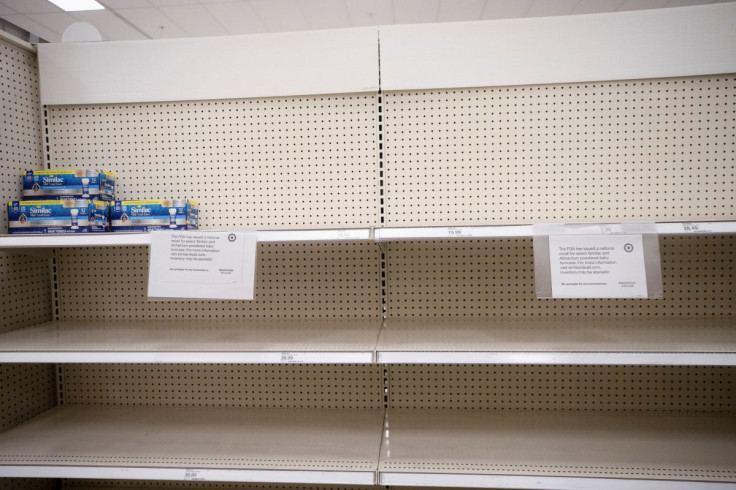U.S. FDA Says Baby Formula Crisis Will Ease In Coming Weeks

The U.S. baby formula shortage should improve dramatically in weeks, the Food and Drug Administration director said on Friday as the Biden administration scrambled to reverse a shortfall that hits lower-income Americans particularly hard.
Commissioner Dr. Robert Califf said the FDA will announce plans next week detailing how manufacturers and suppliers abroad will be able to import their products into the United States, as well as new options for U.S. companies.
The FDA is aiming for a streamlined process that will get more products on U.S. shelves while meeting safety, quality and labeling standards, he said. The $4 billion U.S. baby formula market is dominated by domestic producers, with imports limited and subject to high tariffs.
"We believe these and other ongoing efforts will help dramatically improve the supply in the U.S. in a matter of weeks," Califf said on Twitter. "Our data indicates that in stock rates in retail stores are stabilizing but we continue to work around the clock to further increase availability."
The Biden administration this week has come under increasing pressure to address the problem, which has roots in a February recall of some formulas by one of the nation's main manufacturers, Abbott Laboratories.
U.S. parents rely on baby formula. Fewer than half of babies born in the United States were exclusively breast-fed through their first three months, according to the Centers for Disease Control and Prevention 2020 Breastfeeding Report Card.
Abbott's recall affected formulas, including certain Similac products, made at a Michigan plant after complaints about bacterial infections in infants who had consumed the products.
The shortages have been compounded by supply-chain snags and historic inflation, leaving about 40% of baby formula products out of stock nationwide, data firm Datasembly said.
President Joe Biden met on Thursday with executives from infant formula manufacturers and retailers, pressing them to do everything possible to get families access.
The retailers told Biden their top ask is more flexibility on the types of formula they can sell, while consumers need more flexibility on the types they can buy, particularly through the WIC program for low-income families, the White House said.
The nutrition program for Women, Infants and Children is a federal assistance scheme administered by U.S. states.
Abbott said on Friday it has shipped millions of cans of infant formula powder into the United States from its Ireland facility, particularly to serve consumers who use the WIC program for low-income families.
In states where Abbott has the WIC contract, the company said it will pay rebates on competing products if Similac is not available through August.
About half of infant formula nationwide is purchased by participants using WIC benefits, the White House said, and rules set by individual states have a big effect on the availability and distribution of infant formula.
"The shortage has taken an especially dangerous toll on women and children from underserved communities," U.S. House Speaker Nancy Pelosi said.
The House of Representatives next week will bring up a bill to grant emergency authority to the WIC program to address supply-chain disruptions and recalls by relaxing non-safety-related regulations, she said in a statement on Friday.
Pelosi also said an emergency spending bill to address the infant formula shortage would advance in the House.
In other measures on Capitol Hill, the House Oversight Committee said it plans to investigate the four largest manufacturers of baby formula and seek answers on how to ramp up production and avoid any future shortage.
The committee said on Friday it sent letters seeking information to Abbott Nutrition, Mead Johnson Nutrition, Nestle USA and Perrigo.
The shortage poses a threat to families throughout the country, the letter said, "particularly those with less income who have historically experienced health in equities."
Two other House committees - House Energy and Commerce and Appropriations - planned hearings on the issue.
© Copyright Thomson Reuters 2024. All rights reserved.







